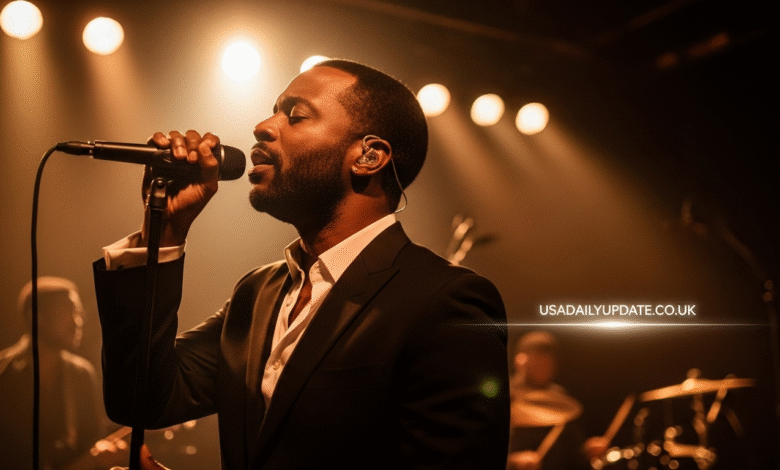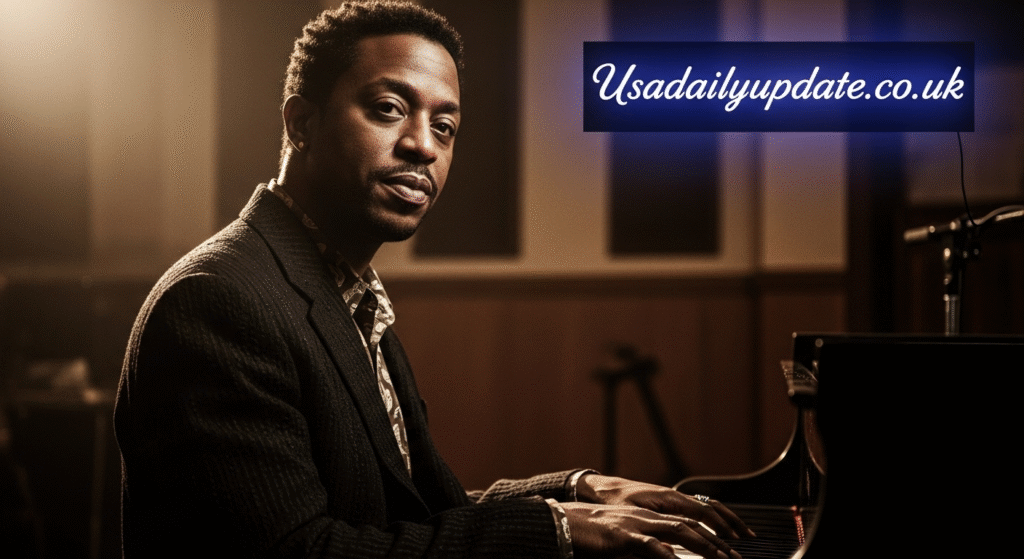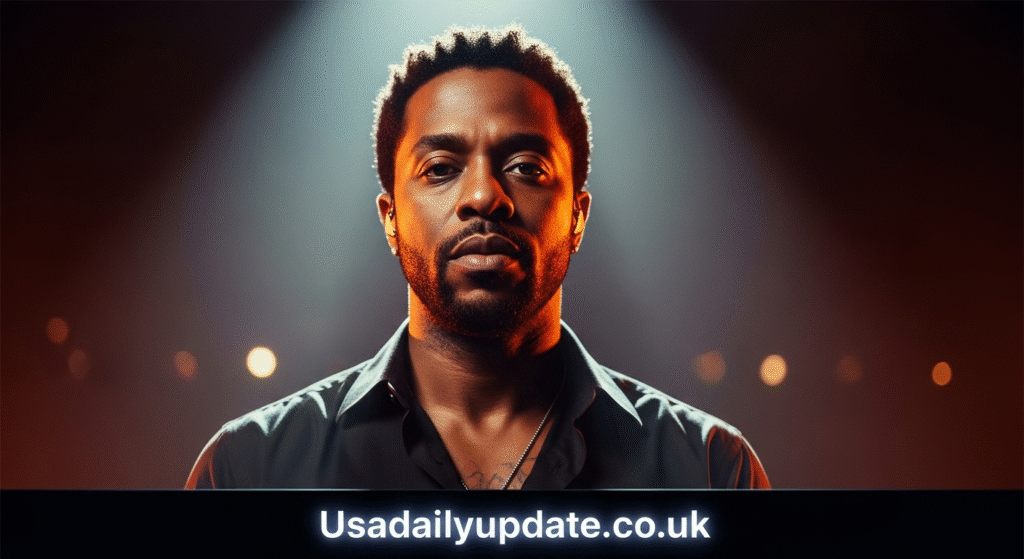D’Angelo Singer: Soulful Genius Who Vanished and Returned

Introduction
You know that feeling when a song just hits your soul differently? That’s what happens when you listen to D’Angelo. This isn’t just another R&B artist we’re talking about. D’Angelo singer revolutionized soul music in the 1990s and created sounds that still influence artists today.
His story is anything but ordinary. Imagine having the world at your feet, then disappearing for 14 years. That’s exactly what D’Angelo did after reaching the peak of his career. The reasons behind his absence are as complex as his music, involving struggles that many artists face but few discuss openly.
In this deep dive, we’ll explore everything about D’Angelo singer, from his early days in Virginia to his groundbreaking albums that defined neo-soul. You’ll learn about his musical genius, his painful retreat from the spotlight, and his powerful return. Whether you’re a longtime fan or just discovering his music, this journey through D’Angelo’s life will give you a new appreciation for one of music’s most enigmatic talents.
The Early Years: Where D’Angelo Singer Began
Virginia Roots and Musical Foundation
Born Michael Eugene Archer on February 11, 1974, in Richmond, Virginia, D’Angelo grew up surrounded by music. His father was a Pentecostal minister, which meant church music filled his childhood. Those gospel roots would later become the foundation of his distinctive sound.
By age three, D’Angelo was already playing piano. That’s not an exaggeration or proud parent talk. He genuinely had an extraordinary natural talent that showed itself incredibly early. The church became his first stage, where he learned to feel music rather than just play it.
His teenage years saw him joining a hip hop group called Michael Archer and Precise. The experience taught him about performance and collaboration. But more importantly, it showed him that his true calling lay in a different direction. He needed to create something entirely his own.
The name D’Angelo came from a combination of his love for the Hank Williams song “Lonesome Angel” and his own first name. He wanted something that sounded classic yet fresh. The stage name would soon become synonymous with a whole new genre of music.
Breaking Into the Industry
D’Angelo’s professional break came when he co-wrote “U Will Know” for the R&B supergroup Black Men United in 1994. The song appeared on the Jason’s Lyric soundtrack and became a hit. Industry insiders started paying attention to this young talent from Virginia.
His songwriting skills caught the ear of EMI Music Publishing. They signed him, recognizing something special in his approach to melody and harmony. Unlike many young artists focused on trends, D’Angelo seemed interested in timeless soul music.
During this period, he also wrote and produced for other artists. Working behind the scenes taught him invaluable lessons about the music business. He learned what worked commercially while maintaining artistic integrity. This balance would define his entire career.
The buzz around D’Angelo singer grew steadily in the early 1990s New York music scene. He wasn’t just another talented singer. He represented something different, a return to organic soul with a contemporary twist.
Brown Sugar: The Album That Changed Everything
Creating a Neo-Soul Masterpiece
When “Brown Sugar” dropped in 1995, it felt like a breath of fresh air in R&B. The album blended classic soul, hip hop beats, and jazz influences into something completely unique. D’Angelo wasn’t following trends. He was creating them.
The title track became an instant classic. Its laid-back groove and sensual lyrics captivated listeners immediately. But the song had layers. It worked as a love song, but also as an ode to marijuana and to the music itself. This type of layered meaning became a D’Angelo signature.
Working with producer Ali Shaheed Muhammad from A Tribe Called Quest proved crucial. Their collaboration brought hip hop sensibilities to soul music in organic ways. The beats felt alive and human, not programmed or sterile. Live instrumentation dominated the sound.
Critics immediately recognized something special happening. The album earned rave reviews and went platinum. More importantly, it established D’Angelo singer as a serious artist with a unique vision. He wasn’t a manufactured pop star but a genuine musician.
The Impact on R&B Music
“Brown Sugar” basically invented neo-soul, even though the term wasn’t widely used yet. Artists like Erykah Badu, Maxwell, and Lauryn Hill would soon follow with similar approaches. Together they created a movement that rejected overproduced commercial R&B.
The album influenced how R&B vocals were approached. D’Angelo’s singing style was conversational and intimate, not showy. He didn’t need vocal gymnastics to convey emotion. His phrasing and tone did the heavy lifting. Younger singers took notice and started adopting similar approaches.
Musicians appreciated the album’s emphasis on live instrumentation. At a time when drum machines and synthesizers dominated R&B, D’Angelo brought back bass guitars, live drums, and electric pianos. The organic sound resonated with listeners tired of sterile productions.
The commercial success proved that audiences wanted substance. “Brown Sugar” showed record labels that quality music with artistic integrity could still sell. This opened doors for other artists who prioritized creativity over commercial calculation.
Voodoo: Reaching Artistic Heights
Five Years in the Making
D’Angelo singer took his time with the follow-up to “Brown Sugar.” Five years might seem excessive, but he was crafting something extraordinary. “Voodoo” arrived in 2000 as a masterclass in sonic experimentation and groove.
The album recording took place at Electric Lady Studios in New York, the legendary space built by Jimi Hendrix. That environment influenced the album’s adventurous spirit. D’Angelo brought together an incredible roster of musicians including Questlove, Pino Palladino, and J Dilla.
The creative process was intensely collaborative. Musicians would jam for hours, searching for perfect grooves. D’Angelo encouraged experimentation and mistakes. Some of the album’s best moments came from spontaneous studio magic. This approach was rare in an era of meticulous digital production.
Perfectionism drove the extended timeline. D’Angelo wouldn’t release anything until it met his exacting standards. He reworked songs repeatedly, sometimes starting over completely. The dedication to quality is evident in every second of the finished album.

Musical Innovation and Critical Acclaim
“Voodoo” pushed boundaries in ways that still sound fresh today. The production was deliberately loose and raw. Drums weren’t perfectly on the grid. Bass lines wandered. Vocals felt improvised even when carefully crafted. Everything served the groove and the feeling.
Songs like “Untitled (How Does It Feel)” became instant classics. The track showcased D’Angelo’s vocal range and emotional depth. Its famous music video, featuring D’Angelo shirtless and singing directly to the camera, became iconic. We’ll address the complications that video created shortly.
“Devil’s Pie” opened the album with a dark, funky warning about the music industry. “Playa Playa” explored relationship dynamics with brutal honesty. Every track offered something substantial to digest. This wasn’t background music. It demanded active listening.
Critics absolutely loved “Voodoo.” It won the Grammy for Best R&B Album in 2001. Many publications named it one of the best albums of the decade. The critical consensus was clear: D’Angelo had created a masterpiece. His place among music legends seemed secure.
The Music Video That Changed Everything
“Untitled” and Its Cultural Impact
The “Untitled (How Does It Feel)” music video premiered in 2000 and immediately caused a sensation. Director Paul Hunter kept it simple: just D’Angelo, shirtless, singing directly to the camera. The sensuality was undeniable. The intimacy was unprecedented for mainstream music.
D’Angelo’s physique in the video became a major talking point. He had transformed his body significantly from his “Brown Sugar” days. The sculpted muscles and intense gaze made him a sex symbol overnight. MTV played the video constantly. It became one of the channel’s most requested videos ever.
Women weren’t the only ones taking notice. The video sparked important conversations about the male gaze and objectification. For once, a man was the object of desire in ways typically reserved for female artists. Some found this refreshing. Others found it uncomfortable.
The video won multiple awards and remains iconic decades later. Its influence on music videos continues today. Artists still reference its aesthetic and approach. The single camera, intimate performance style became widely imitated. D’Angelo singer had created another cultural moment.
The Unintended Consequences
What seemed like a triumph quickly became a burden. D’Angelo felt reduced to his body rather than celebrated for his music. Interviews became uncomfortable as journalists focused on his appearance. Concert audiences screamed for him to remove his shirt rather than appreciating the music.
The objectification took a serious toll on his mental health. He had always been somewhat private and introspective. Suddenly being a sex symbol conflicted with his identity as a serious musician. The disconnect created internal turmoil that he struggled to resolve.
D’Angelo began using alcohol and other substances to cope with the pressure. The weight of expectations from the record label, fans, and media became crushing. He felt trapped between commercial demands and artistic integrity. Something had to give, and eventually, it did.
This period marked the beginning of his retreat from public life. The “Untitled” video’s success paradoxically contributed to his disappearance. Understanding this context is crucial to appreciating D’Angelo’s later journey and eventual comeback.
The Long Silence: Fourteen Years Away
Personal Struggles and Legal Issues
After “Voodoo’s” success, D’Angelo singer essentially vanished. He stopped performing regularly and disappeared from the public eye. Fans wondered what happened to the artist who seemed destined for legendary status. The truth involved serious personal struggles.
Reports of substance abuse issues surfaced over the years. D’Angelo battled addiction privately while the industry and fans speculated about his absence. These weren’t tabloid exaggerations but genuine health crises. He needed time away from music to address fundamental problems.
Legal troubles compounded his difficulties. Multiple DUI arrests made headlines. A 2005 incident in Richmond resulted in serious charges. These public stumbles revealed the depth of his personal crisis. The confident artist from “Voodoo” seemed to have disappeared completely.
Friends and collaborators occasionally provided updates. Questlove and others maintained that D’Angelo was working on music. But years passed with no album. Some fans gave up hope. Others remained patient, trusting that the artist would return when ready.
The Industry Pressure and Creative Block
Record label pressure played a significant role in D’Angelo’s absence. After “Voodoo’s” success, expectations for the next album were astronomical. How do you follow a masterpiece? The pressure paralyzed rather than motivated him.
Creative perfectionism that served him well became an obstacle. D’Angelo recorded countless songs during this period but couldn’t finish an album. Nothing met his impossibly high standards. The more time passed, the more pressure built, creating a vicious cycle.
Changes in the music industry made his return more complicated. The R&B landscape shifted dramatically between 2000 and 2014. Auto-tune dominated. Production became more electronic. D’Angelo’s organic approach seemed out of step with contemporary trends. Finding his place in this new environment required careful thought.
He also struggled with the artist versus celebrity dichotomy. D’Angelo wanted to be known for music, not scandal or appearance. But modern fame doesn’t allow that separation easily. Figuring out how to exist as an artist in the social media age took time.
Black Messiah: The Triumphant Return
Surprise Release and Critical Reception
On December 15, 2014, D’Angelo shocked the music world. “Black Messiah” appeared with virtually no warning, just days after he had announced its completion. The surprise release strategy, popularized by Beyoncé, felt perfect for his return. No hype cycle. No pressure. Just music.
The album addressed heavy themes. Police brutality, systemic racism, personal redemption, and spiritual searching all appeared in the lyrics. D’Angelo singer had matured significantly. The playful sensuality of earlier work evolved into deeper social consciousness. Life experience shaped every song.
Musically, “Black Messiah” continued his experimental approach. The production felt even more raw and live than “Voodoo.” Guitar solos sprawled. Rhythms shifted unexpectedly. Songs felt like jam sessions rather than polished studio creations. The imperfection became the perfection.
Critics unanimously praised the album. It appeared on countless year-end best-of lists. Many called it worth the 14-year wait. The Grammy nominations followed. D’Angelo had returned not as a nostalgia act but as a relevant, vital artist. The comeback seemed complete.
Social and Political Context
“Black Messiah” arrived during intense social upheaval. The deaths of Michael Brown and Eric Garner had sparked nationwide protests. The Black Lives Matter movement was gaining momentum. D’Angelo’s timing, whether intentional or coincidental, proved perfect.
Songs like “1000 Deaths” and “The Charade” directly addressed police violence and systemic oppression. D’Angelo wasn’t being preachy or didactic. He channeled righteous anger into powerful music. The album became a soundtrack for the moment, giving voice to collective pain and resistance.
The title itself sparked conversation. “Black Messiah” could be interpreted multiple ways. Was it about expecting a savior? Recognizing shared humanity? Acknowledging imperfection? D’Angelo deliberately left it open to interpretation. Ambiguity created space for personal connection.
The album proved that D’Angelo singer remained culturally relevant. He wasn’t stuck in 1990s neo-soul nostalgia. He engaged with contemporary issues while maintaining his distinctive sound. This balance between timelessness and timeliness impressed both critics and fans.
D’Angelo’s Musical Legacy and Influence
Impact on Contemporary R&B
You can hear D’Angelo’s influence across modern R&B. Artists like Frank Ocean, The Weeknd, Anderson .Paak, and SZA all draw from the neo-soul blueprint he helped create. The emphasis on live instrumentation, vocal intimacy, and artistic integrity all trace back to his work.
Producers study his albums for their approach to groove and space. The “Voodoo” sound, with its loose, behind-the-beat feel, remains a gold standard. Musicians recognize the difficulty of creating something that sounds effortless while being technically complex. D’Angelo makes it look easy.
His influence extends beyond sound to career approach. Many artists now take longer between releases, prioritizing quality over quantity. The idea that an artist can disappear and return on their own terms became more acceptable. D’Angelo proved that authentic artistry can survive industry pressure.
Vocally, his conversational style opened doors for singers who didn’t fit traditional R&B molds. You don’t need to belt or run scales to convey emotion. Sometimes restraint and phrasing communicate more than vocal acrobatics. This philosophy influenced a generation of singers.
Awards and Recognition
D’Angelo singer has earned numerous accolades throughout his career. He’s won multiple Grammy Awards, including Best R&B Album for both “Voodoo” and “Black Messiah.” These wins recognized not just commercial success but genuine artistic achievement.
Industry peers consistently cite him as an influence and inspiration. When artists discuss their favorite albums, D’Angelo’s work appears frequently. This respect from fellow musicians often matters more than commercial metrics. He’s earned his place in the musician’s musician category.
“Voodoo” regularly appears on greatest albums lists. Rolling Stone, Pitchfork, and countless other publications rank it among the best albums of the 2000s. Some critics argue it’s one of the greatest R&B albums ever made. Time has only enhanced its reputation.
Beyond awards, his legacy lives in the artists he’s influenced and the standards he’s set. D’Angelo proved that R&B could be adventurous, socially conscious, and commercially viable simultaneously. This example continues inspiring artists who refuse to compromise their vision.
Where Is D’Angelo Now?
Recent Performances and Projects
D’Angelo has continued performing since the “Black Messiah” release. His live shows are legendary experiences. He and his band, The Vanguard, create extended jams that reimagine his catalog nightly. No two performances are identical. Seeing him live remains on many music fans’ bucket lists.
Touring has been selective rather than extensive. D’Angelo doesn’t do massive world tours or festival circuits constantly. He performs when he wants, on his terms. This selectivity maintains his mystique while preserving his mental health. Quality over quantity applies to performances too.
Collaborations have been sparse but meaningful. He’s contributed to projects by artists he respects. Each appearance feels intentional rather than random. When D’Angelo singer shows up on a track, people pay attention. His features carry weight because they’re rare.
Rumors about new music circulate constantly. Given his history, no one expects quick turnarounds. Fans have learned patience. Whether another album arrives in two years or ten, most trust it will be worth the wait. The perfectionist approach hasn’t changed.
Personal Growth and Recovery
D’Angelo has been open about his recovery journey in limited interviews. Overcoming addiction and mental health challenges took years of work. He credits family, friends, and faith for supporting him through the darkest periods. The vulnerability in discussing these struggles has resonated with fans.
He appears healthier and more grounded now than during his peak fame years. The peace is visible in interviews and performances. D’Angelo seems comfortable with who he is rather than trying to meet others’ expectations. This authenticity makes his later work even more powerful.
His relationship with fame has evolved. D’Angelo understands now that he can control his boundaries. He doesn’t owe anyone access to his private life. The music speaks for itself. Fans have largely accepted this approach and respect his privacy more than in earlier years.
The journey from rising star to troubled recluse to triumphant artist makes D’Angelo’s story compelling beyond just music. It’s about human struggle, recovery, and redemption. Many people relate to these themes even if their specific circumstances differ.
Why D’Angelo Singer Matters Today
Artistic Integrity in Commercial Music
In an era of streaming, viral hits, and algorithm-driven success, D’Angelo represents something different. He proves that artistic vision can coexist with commercial success. You don’t have to chase trends or compromise your sound to matter. Authenticity still resonates with audiences.
His approach to album creation seems almost anachronistic now. Taking years to craft albums, using live musicians, and resisting outside pressure all seem impractical. Yet his success challenges industry assumptions about what works. Maybe the old ways still have value.
Young artists studying D’Angelo learn that longevity comes from substance, not gimmicks. His catalog, though small, remains timeless. Songs from “Brown Sugar” still sound fresh 30 years later. This durability beats having dozens of forgettable hits that age poorly.
The music industry needs artists like D’Angelo singer who prioritize art over commerce. They remind everyone why music matters beyond entertainment. They push boundaries and set standards. They prove that audiences crave substance when given the opportunity.
The Neo-Soul Revival
Neo-soul never really died, but it’s experiencing renewed interest. Younger listeners discovering D’Angelo through streaming platforms are falling in love with the sound. The organic, human quality of his music offers relief from hyper-produced contemporary tracks.
Artists openly embrace the neo-soul label now where it once seemed limiting. They recognize the genre’s richness and the foundation laid by D’Angelo and peers. This acknowledgment helps preserve and extend the tradition into new contexts.
The production techniques D’Angelo pioneered are being rediscovered and reapplied. Engineers and producers study “Voodoo’s” sonic approach. The loose, behind-the-beat feel influences contemporary production choices. Musical knowledge passes between generations through his work.
As R&B continues evolving, D’Angelo’s influence remains constant. He’s the measuring stick against which serious R&B artists compare themselves. His commitment to craft and quality sets standards that others aspire to reach. The neo-soul king’s throne remains secure.

Conclusion
D’Angelo singer represents everything beautiful and challenging about artistic genius. His incredible talent gave us timeless albums that redefined R&B. His struggles remind us that fame extracts heavy costs. His comeback proves that redemption and second chances are possible.
His relatively small catalog of three studio albums across nearly 30 years might seem modest. But quality matters more than quantity. Each album stands as a complete artistic statement. Each rewards repeated listening with new discoveries. This depth ensures his legacy endures.
Whether D’Angelo releases another album or not, his place in music history is secure. He changed how R&B sounds, how artists approach their craft, and what audiences expect from soul music. The influence ripples through contemporary music in countless ways.
For fans old and new, D’Angelo’s music offers something increasingly rare: art that demands and rewards your full attention. In our distracted age, that might be his most important legacy. Have you taken time to really listen to “Voodoo” or “Black Messiah” lately? Maybe it’s time to rediscover why D’Angelo singer remains one of music’s most important voices.
Frequently Asked Questions
What is D’Angelo’s real name?
D’Angelo’s birth name is Michael Eugene Archer. He was born on February 11, 1974, in Richmond, Virginia. He adopted the stage name D’Angelo early in his career, combining elements from the song “Lonesome Angel” and his first name to create something memorable and distinctive.
Why did D’Angelo disappear for 14 years?
D’Angelo struggled with substance abuse, mental health issues, and the pressure of fame after “Voodoo’s” success. He felt objectified after the “Untitled” video and battled perfectionism regarding new music. These combined factors led to his extended absence from the music industry between 2000 and 2014.
What is D’Angelo’s most famous song?
“Untitled (How Does It Feel)” from the “Voodoo” album is arguably D’Angelo’s most famous song. The track became iconic partly due to its sensual music video. However, songs like “Brown Sugar,” “Lady,” and “Devil’s Pie” are also extremely popular among fans and critics alike.
How many albums has D’Angelo released?
D’Angelo has released three studio albums: “Brown Sugar” in 1995, “Voodoo” in 2000, and “Black Messiah” in 2014. This relatively small catalog reflects his perfectionist approach to music creation and the personal struggles that kept him from recording during extended periods.
What is neo-soul music?
Neo-soul is a genre that emerged in the 1990s, blending classic soul, R&B, jazz, hip hop, and funk. D’Angelo helped pioneer the sound with “Brown Sugar.” Neo-soul emphasizes live instrumentation, organic production, socially conscious lyrics, and vocal intimacy over the heavily produced commercial R&B of that era.
Is D’Angelo still making music?
Yes, D’Angelo continues making music and performing live, though he releases albums on his own timeline. He tours periodically with his band The Vanguard. While no new album has been announced, he remains musically active and fans anticipate future releases whenever he’s ready.
What instruments does D’Angelo play?
D’Angelo is a multi-instrumentalist who plays piano, keyboards, guitar, and drums. He started playing piano at age three in his father’s church. His instrumental skills allow him to contribute to his albums beyond vocals, often playing multiple instruments on tracks and directing arrangements.
Has D’Angelo won any Grammy Awards?
Yes, D’Angelo has won two Grammy Awards for Best R&B Album, for “Voodoo” in 2001 and “Black Messiah” in 2016. He’s received multiple other Grammy nominations throughout his career. These awards recognize both his commercial success and significant artistic contributions to contemporary music.
Who are D’Angelo’s musical influences?
D’Angelo cites Prince, Marvin Gaye, Jimi Hendrix, Al Green, and Sly Stone as major influences. His gospel upbringing and church music foundation also shaped his sound. He’s also influenced by hip hop artists like A Tribe Called Quest and jazz musicians across generations.
What happened with D’Angelo’s DUI arrests?
D’Angelo faced multiple DUI arrests during his difficult period in the 2000s, with notable incidents in 2005 and 2010. These legal troubles reflected his struggles with substance abuse. He’s since addressed these issues through recovery and has been open about his journey toward sobriety and health.
Also Read Usadailyupdate.co.uk



